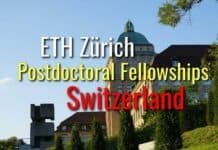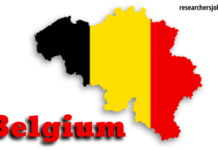Postdoctoral (AMBER Cofund Program): The International Institute of Molecular Mechanisms and Machines (IMol), Polish Academy of Sciences in Warsaw, Poland, is seeking a highly motivated Postdoctoral Researcher to join a cutting-edge project on mitochondrial protein import. The project is part of the AMBER EU COFUND program under the prestigious Marie Skłodowska-Curie Actions (MSCA), offering exceptional research and training opportunities across Europe.
Postdoctoral Research Position – Mitochondrial Protein Import in Health and Disease (AMBER Cofund Program)
Job Summary Table:
| Field | Details |
|---|---|
| Designation | Postdoctoral Researcher |
| Research Area | Mitochondrial Protein Import, Molecular Biology, Biochemistry, Mass Spectrometry, Structural Biology |
| Location | IMol, Polish Academy of Sciences, Warsaw, Poland |
| Project Title | Functional alterations of protein import into mitochondria |
| Principal Investigators | Prof. Agnieszka Chacinska and Dr. Remigiusz Serwa |
| Start Date | January 2026 |
| Fellowship Duration | 36 months |
| Application Deadline | 8 September 2025 |
| Evaluation Period | 22 September – 17 November 2025 |
| Decision Announcement | 5 December 2025 |
Eligibility / Qualification:
Minimum Requirements (as per MSCA COFUND):
- Ph.D. in molecular biology, biochemistry, or chemistry.
- Maximum 8 years of postdoctoral research experience.
- At least one original peer-reviewed publication.
- Mobility Rule: Candidates must not have resided/worked/studied in Poland for more than 12 months in the last 3 years.
- Fluent in English (minimum CEFR B2).
Specific Qualifications for Subproject:
- Expertise or interest in mass spectrometry, structural biology, and cell biology.
- Strong motivation, creativity, and analytical skills.
- Ability to work both independently and collaboratively.
Job Description:
This project focuses on understanding the functional and architectural differences between two isoforms of the mitochondrial TIM23 translocase complex. These protein import mechanisms are essential to mitochondrial function and cellular health. The study will explore quality control and regulatory mechanisms within the inner mitochondrial membrane using advanced cell and molecular biology and proteomics techniques.
Key responsibilities:
- Conduct molecular experiments on mitochondrial protein transport.
- Analyze structural and functional variations in TIM17/TIM23 isoforms.
- Collaborate across labs in a multidisciplinary research environment.
- Participate in training and secondment activities under AMBER.
About the AMBER Program:
AMBER (Advanced Multiscale Biological imaging using European Research infrastructures) is an EU-funded MSCA COFUND project. It offers interdisciplinary research opportunities across partner institutions such as:
- Lund University/MAX IV (Sweden)
- European Spallation Source (Sweden)
- EMBL (Germany)
- ILL (France)
- IMol (Poland)
- Leicester Institute of Structural and Chemical Biology (UK)
Fellows benefit from:
- Access to world-class imaging and analytical infrastructure.
- Interdisciplinary training and mentoring.
- International networking opportunities.
- Career development planning.
How to Apply:
1. Fill the online application form:
👉 Application Form Link
2. Submit a full application through AMBER portal:
👉 https://www.ambercofund.eu/for-applicants
Application documents (PDF format, in English):
i) Europass-format CV
ii) Detailed research plan (3–5 pages recommended)
iii) Secondment letters (if any)
iv) English proficiency evidence
v) Draft Individual Career Development Plan
vi) Two reference letters
vii) Supporting documents
viii) Ethical questionnaire
ix) Position preference list (if applying to multiple positions) to be emailed to: amber@linxs.se
Note: Incomplete applications will not be considered.
Contact:
For position-related queries:
📧 hr@imol.institute
More about IMol: https://imol.institute/about-us/institute/
For AMBER program info:
🌐 https://ambercofund.eu
More postdoc positions under AMBER:
🌐 Euraxess Postdoc Jobs
Apply by: 8th September 2025
Embark on a research journey that combines scientific depth, international collaboration, and career advancement in one of Europe’s premier biomedical hubs!








